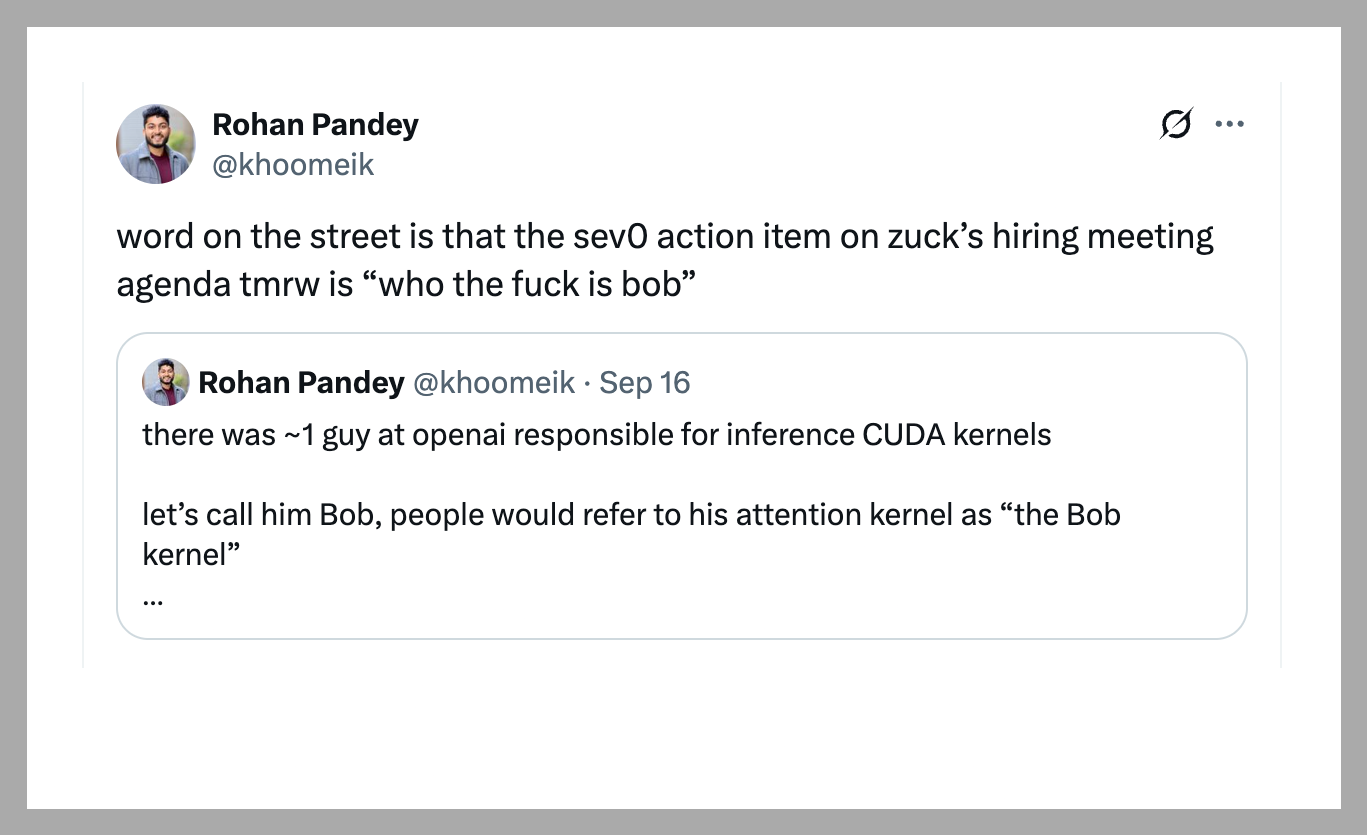OpenAI Poaches Apple; Grok on the Cheap; AI Singer's $3M Deal

(Plus: Guest Essay - What Could Possibly Go Right?)
💼 Business & Strategy
OpenAI’s Apple-Style Hardware Heist
OpenAI is swiping dozens of Apple veterans (led by ex-Apple exec Tang Tan) and lining up iPhone manufacturers Luxshare and Goertek to build an AI-native device portfolio.
Concepts under exploration include a display-less smart speaker, glasses, a pin wearable, and a voice recorder, with a first wave targeted for late 2026–early 2027.
The design through-line: Jony Ive’s influence and an Apple-grade supply chain - minus the Apple bureaucracy. The bet is simple: if the future interface is ambient and multimodal, ship hardware that makes assistant-as-OS feel inevitable.
Read more: The Rundown AI
xAI’s Grok 4 Fast Drives The Cost Curve Down
Grok 4 Fast promises near-frontier reasoning while using ~40% fewer thinking tokens and cutting effective costs by up to 98% versus Grok 4.
Cited scores: 85.7% on GPQA Diamond and 92% on AIME 2025, a 2M-token context, and native tool use for web/code. If those numbers stick, the headline isn’t raw IQ - it’s unit economics: real-time agents, lower latency and reasonable bills for compute-sensitive use cases.

Read more: The Rundown AI, AI Secret
🔬 Research & Science
New Bio Frontier: AI Designs Working Viruses
A Stanford/Arc Institute team trained an AI on ~2M viral sequences and designed 302 novel bacteriophages; in lab tests, 16 successfully infected and killed drug-resistant E. coli. Some included 392 never-seen mutations and beat resistance faster than natural phage.
It’s an early result (preprint), but the direction is unmistakable: from reading/writing genomes to designing them - blurring lines between drug discovery and biosecurity.
Read more: AI Secret
🛡️ Talent Wars
OpenAI’s Rumored “Bob” And The Kernel Hunt

AI Secret recounts Valley chatter about a shadow CUDA kernel ace nicknamed “Bob” - the alleged author behind attention kernels that run trillions of times across GPU fleets. Whether legend or hiring beacon, the story spotlights a real bottleneck: ultra-rare systems talent where a single bug can torch millions in compute (apparently Bob fixes that in a flash). In an era obsessed with GPUs, it’s also about the people who make them sing.
Read more: AI Secret
🎭 Culture & Media
AI Artist 'Xania Monet' Signs A $3M Deal
Mississippi poet Talisha Jones’s AI-assisted R&B persona Xania Monet signed a $3M contract after Billboard charting and 10M U.S. streams in a week.
Jones uses Suno alongside live elements and self-written lyrics. Labels see upside; skeptics see copyright gray zones.
Either way, AI-native acts are crossing from novelty to commercial pipeline.

Read more: The Rundown AI
Luma’s CEO: “Hollywood Is Dead” (Unless It Adapts)
With Ray3, Luma’s Amit Jain says small teams can iterate dozens of ideas at near-studio fidelity, threatening the blockbuster moat of $200M franchises. If taste, distribution, and community become the new moats, the power shift isn’t AI vs. actors; it’s AI vs. legacy greenlight economics.
(And with the Ellisons in the mix, I think we know this kind of "efficiecies" will accelerate.)
Read more: AI Secret
✍🏼 Guest Essay: What Could Possibly Go Right With AI?
...in Light of the Latest Pew Research
We all know that Americans are curious but cautious about AI. Pew’s latest study finds 50% are more concerned than excited, while only 10% feel the reverse. Over half think AI could hurt creativity (53%) or relationships (50%). Yet almost everyone (95%) has heard of AI, and 62% use it several times a week. That’s a lot of exposure - and a lot of potential.
So, what could go right?
AI as a Sidekick, Not a Replacement
People are fine with AI crunching data, predicting weather, or even helping discover new medicines. In fact, 47% now say they’ve heard “a lot” about AI - nearly double since 2022. When AI takes care of the heavy lifting, we get more time for creativity, connection, and the human stuff only we can do.
More Control, More Trust
The big wish: control. Only 13% feel they have much say in how AI affects their lives, but 61% want more. If companies label AI content, build in transparency, and invite people into decision-making, trust grows - and so does optimism.
A Shared Project
AI’s future isn’t just in tech labs or policy rooms. It’s ours to design together. Policymakers can set guardrails, companies can prioritize ethics, and everyday people can stay informed and vocal. Done right, AI could reduce friction in daily life, expand access for all, and even bring some joy.
The Pew survey reminds us: Americans see both risks and possibilities in AI. What tips the balance is us. A future worth living in is one where AI amplifies human capabilities instead of replacing them, giving us better tools for science, creativity, and everyday problem-solving.
It’s a future that enhances well-being and quality of life, cutting friction out of daily tasks and expanding access to health, learning and opportunity. It’s a future built on transparency and trust, where people know when AI is involved and feel they have real control. It’s also a moment for civic and ethical renewal, to re-center on fairness, dignity and shared values.
And ultimately, it’s a future we design together - policymakers, technologists, communities, and everyday users - ensuring AI strengthens what makes us most human. If we embrace that shared responsibility, then what could possibly go right with AI isn’t just a question.
It’s an invitation.
By Michael Phillips, Technology Evangelist
🧩 Builder Tip
Notion AI Builds A CRM Pipeline From A Prompt
Instead of hand-wiring schemas, prompt Notion AI to generate a CRM dashboard with stages, filters, and follow-ups (e.g., email, subscriber type, first/second contact, conversion and reason no conversion).
Refine to Kanban, swap toggles for checkboxes, and add deal size or reminders.
The trick: crisp, specific prompts produce cleaner database scaffolds you can tune in minutes.
Read more: The Rundown AI,
🚀 Tools & Launches (Expanded)
- Metaprompt — Lightweight prompt enhancer for clearer task structure and higher model adherence when you don’t want to hand-craft prompts.
- Studio 3.0 (ElevenLabs) — Evolves from voice to timeline-aware editing with video support, smoothing ad and explainer workflows that blend narration and visuals.
- Teable — “Data-to-action” layer to operationalize customer data, batch-generate content, and automate ops without heavyweight CRM add-ons.
- Caladan — Fundraising copilot: search 5,000+ VCs, craft personalized outreach, and package a founder profile that doesn’t get lost in the inbox.
- Dart — Chat-to-plan project management—then deploy agents to execute mapped work. PM as a loop: brief → automate → review.
- Sudo — Monetization for AI devs: turn API calls/generations into revenue without rolling your own billing/metering stack.
Today’s Sources:
The Internet
AI Secret,
The Rundown AI
